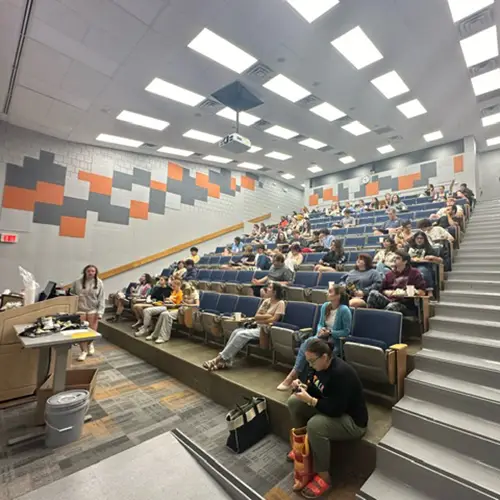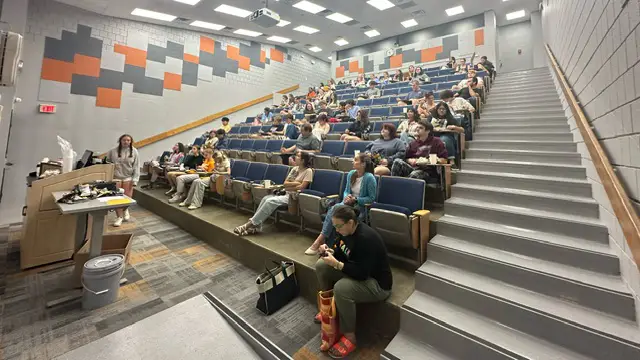Political Science Engaging Students in Election

Political Science Engaging Students in Election

Pre-election Politics Panel
6-8 p.m. Wednesday, October 23
Both will be in the John C. Hodges Library, Lindsay Young Auditorium
The 2024 election season is not only historic but also the first opportunity for many University of Tennessee students to cast ballots for a US president. The Department of Political Science is encouraging all students to engage in this core element of democracy with thoughtful and fun events on the Knoxville campus.
More than 50 students gathered to watch the September presidential debate with faculty experts, discussing former President Donald Trump and Vice President Kamala Harris, the candidates’ positions, and the state of the race. The next opportunity for students will be an October 1 vice presidential debate watch party.
The political science gatherings allow students to explore issues that are important to them now and in the future, from college affordability to climate change, noted Department Head Brandon Prins.
Experts in the Room
Assistant Professors Stephanie Pierce, Kirsten Widner, Carolyn Holmes, and Kelly Morrison have organized the events and are on hand to answer students’ questions at the debate watch parties, with their expertise in areas including public policy, international relations, and more.
The Department of Political Science also will host a pre-election panel October 23, with several faculty members discussing the issues and strategies on display in a more formal, academic setting.
An event being planned following the November 5 presidential election will provide context for the historic election season.
Engagement and Craftivism
The department is sharing with students a presentation that includes key information, from voter registration deadlines to sources for reliable candidate information. It also points Volunteers to opportunities such as serving as a poll worker or participating in the Vols Vote registration competition between the University of Tennessee and University of Florida.
Students also took the initiative to add another element to the October 1 watch party: crafting. Some noticed at the first event faculty members who were knitting, an activity that can help with anxiety. Now students are organizing a crafting circle for the vice presidential debate watch party.
“We’re having conversations around craftivism and the importance of artwork and crafting in political spaces,” said Angel Orenstein, event coordinator for the department. “That connection between your body doing creative, physical work while you consider difficult or complex questions of morality is a powerful way to work through those feelings.”
Election-themed crafts will be available before the debate begins, while students also can ask any pre-debate questions and hear more about how to become engaged citizens. From 9-11 p.m. there will be pizza and other refreshments, along with prizes for winners of a debate bingo activity.
Beyond the Ballot
The department’s courses offer several ways for students to delve deeply into topics, including Political Science:
- 312 Popular Culture and American Politics,
- 420 Political Attitudes and Behavior,
- 421 Political Parties and Interest Groups,
- 422 Political Campaigns and Elections, and
- 425 Media and Politics.
“Political science provides an interesting vantage point to explore and better understand human social behavior: what social groups want, how they get it, and how decision strategies affect political outcomes,” Prins noted. “Further, political science combines elements of history, sociology, economics, geography, and anthropology, and this interdisciplinary perspective or worldview enriches our understanding of human behavior.”
Majoring in political science is not just a path for students heading to law school or graduate school, he explained, but also for those interested in careers in the foreign service, Peace Corps, and organizations concerned with climate change, social justice, global development, and immigration.
By Amy Beth Miller